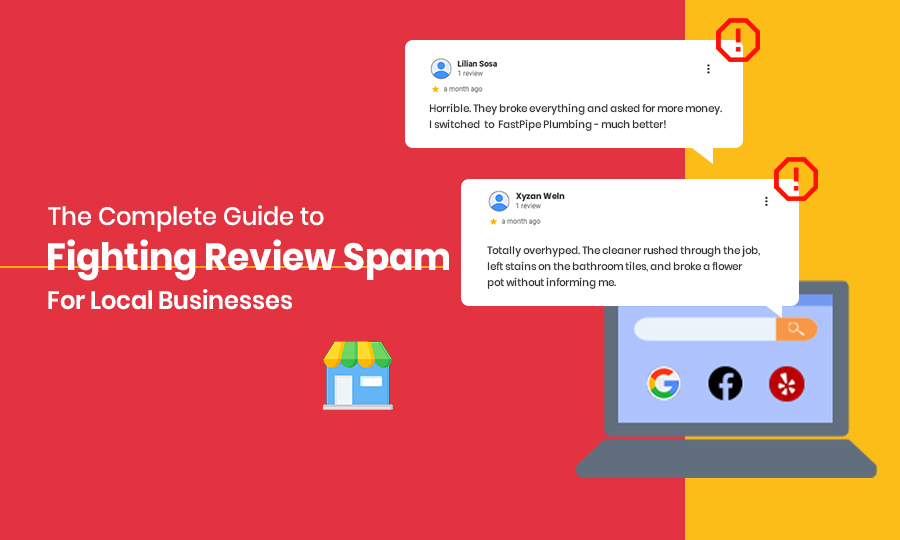Among the numerous digital marketing advancements, online customer reviews bring meaningful promotional opportunities for local businesses. However, the reality of online reviews and their substantial impact on modern consumer behavior is not always favourable. Local business owners must know how to manage the consequences of spam reviews. Fighting review spam is crucial and requires implementing certain effective strategies.
Nowadays, there are so many ways to hurt a local business’s reputation, especially their online presence. And one of the techniques is to leave fake or spam reviews online. Through their spam reviews, individuals and even other competitor brands can try to harm your local business’s reputation for various reasons.
Did you know that almost 30% of online reviews are considered fake? If your local business’s online presence is spammed with fake reviews, it’s time to get it fixed. Otherwise, spam reviews can adversely affect your business’s online reputation and overall revenue.
Here in this blog, we’ll talk about how you can take the necessary steps to combat spam reviews. You’ll get to learn how you can accurately identify spam reviews and the impact they can have on your local business.
What Is Review Spam for Local Businesses?
It refers to the fraudulent or misleading reviews that are posted on online review platforms to damage the reputation of a local business, its products, or services. Individuals, competitor brands, and even automated systems (bots) can leave spam reviews about a local business to deceive its customers or manipulate its online rankings.
For example, your local competitors or some individuals may want to harm your reputation as your business grows and receives widespread appreciation locally. What is the easiest way to hurt your local brand’s online image? The competitor will be more likely to leave fake or spam reviews about your brand across online review sites.
Online review spam can include both fake and favourable reviews posted by your competitors for their business and unfavourable ones for your brand. In today’s digital age, major online review sites represent an irresistible temptation to spammers.
Three major review sites through which you can receive spam reviews are as follows.
- Yelp
The increasing likelihood of receiving spam reviews highlight the systemic platform weaknesses. It also highlights the importance of online review monitoring and management for local businesses. There are a variety of reasons why people write spam reviews about a company. But it can severely affect a local business’s growth, no matter why it has received those reviews. To avoid this, you can hire a professional review management agency to accurately monitor and analyze the reviews your local business receives over time.
7 Types of Spam Reviews Your Local Business Can Receive
Identifying the types of fake reviews is crucial for you, as it will immensely help you in fighting review spam in the future. Not all spam reviews are the same. People can share different types of spam reviews for different reasons. The type and nature of those reviews vary based on the reviewer’s intention.
Explore the 7 major types of spam reviews your local business can receive.
- Promotional Spam Reviews
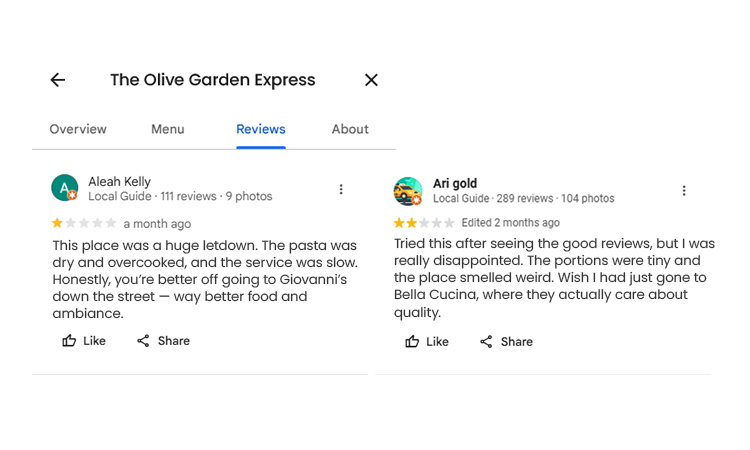
Competitor brands or their employees often write these reviews on your review site profiles. They aim to promote their products or services by exaggerating their benefits. Through these reviews, they often try to create a false sense of a positive experience with their products or services.
Example: Imagine that you have a local restaurant. But you have received fake positive reviews of your competitor’s food joints on your online business profile, like Google Business Profile (GBP) or Yelp. The reviews excessively praise the food and the environment that your competitor restaurant offers. Additionally, the reviewer has used generic positive adjectives without mentioning any specific details of personal experience.
- Defamatory Spam Reviews
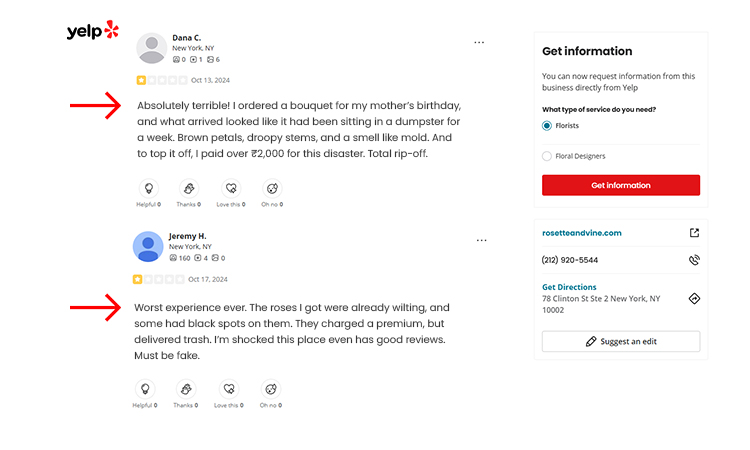
These are mostly false reviews with wrong and misleading information about your local business. These spam reviews can damage your business’s online reputation or defame you as an owner.
Example: For example, you own a local flower shop and created a business profile on online review sites to generate positive reviews about your products. As your local small business is growing rapidly, some of your competitors want to create a false narrative about your product offerings. They leave spam reviews where they falsely accuse your flowers of selling poor-quality and rotten flowers at high prices.
- Duplicate Spam Reviews
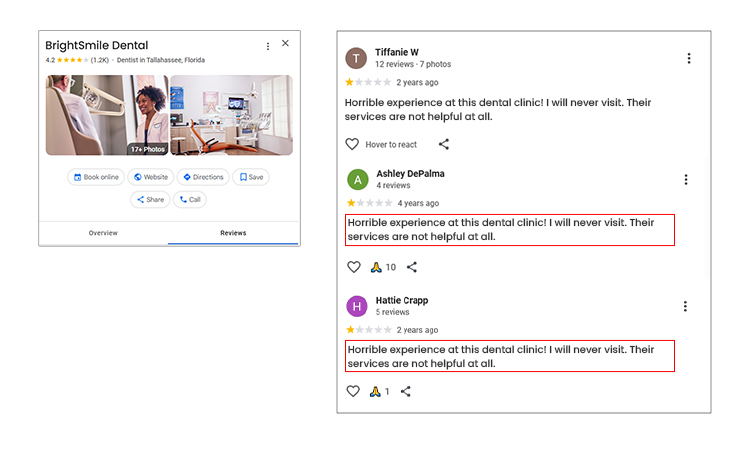
You may struggle a lot to identify these reviews as most of them are duplicates. The reviewer posts such spam multiple times, often from numerous user accounts. In most cases, the competitor brands use automated tools or bots to copy-paste such reviews and share them on online review sites.
Example: Someone has posted a review saying, ‘Horrible experience at this dental clinic! I will never visit. Their services are not helpful at all,’ multiple times on your GBP profile from different user accounts. If the review is genuine, the reviewer must have shared it once from an original online profile.
- Unrelated Promotional Spam Reviews
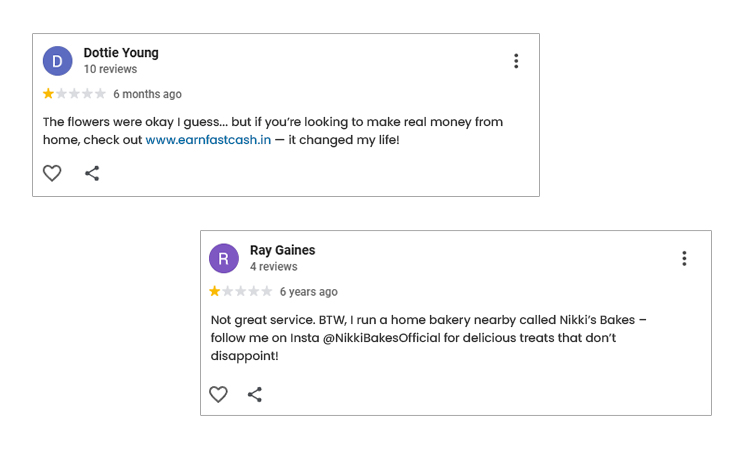
These reviews are not reviews actually, as they contain irrelevant content which is not at all related to a business’s products or services. These reviews often spam your online profiles and shift the attention from the positive reviews you’ve received.
Example: You have a local jewellery business. But you’ve received reviews that contain irrelevant links or promotions of other websites, such as ‘best insurance policy provider! Click the link to know more https://xyzpolicy.com’ or ‘premium salon services – hair, face, nails, and what not!’.
As you can already see that these reviews are not relevant to your business; these are just promotions of other businesses through your online review profiles. So that when a consumer visits your online profiles to check the reviews you’ve received, they get to know about those businesses as well.
- Irrelevant Fake Reviews
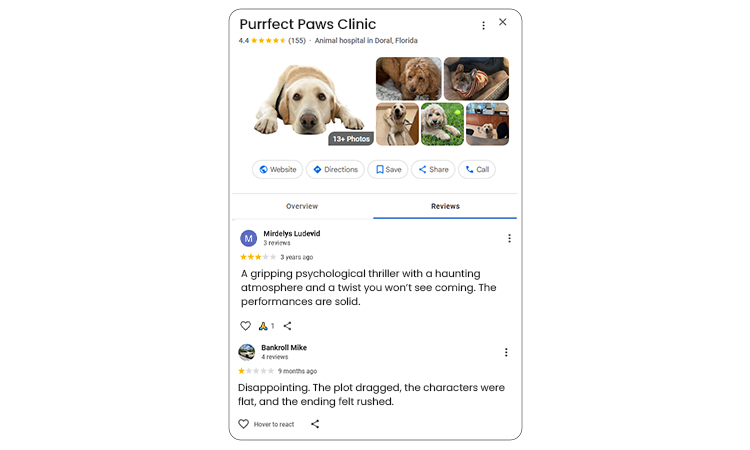
These are completely irrelevant reviews that your local business may receive. These will be completely unrelated to the feedback on your products or services. Such irrelevant spam reviews often discuss different topics.
Example: Suppose you run a local pet care clinic. Instead of sharing their reviews regarding the quality of pet care you provide at your clinic, someone has posted a review of a movie or a book on your online review site profile. Fighting review spam is crucial as these irrelevant reviews can prevent you from attracting more clients to your pet care clinic.
- Repetitive Spam Reviews
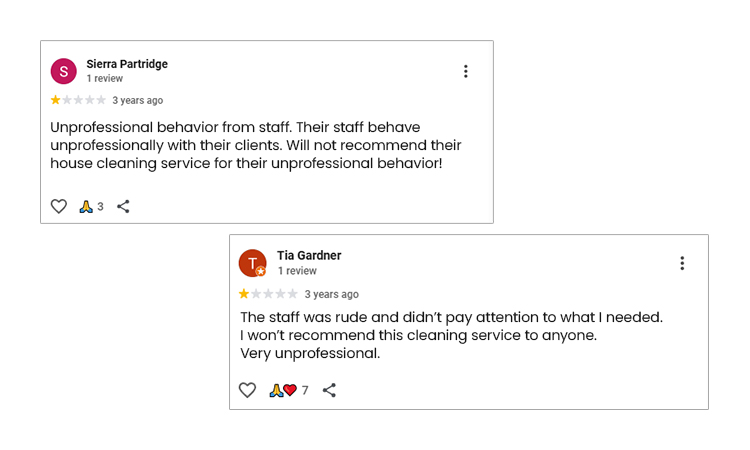
To identify these types of reviews, you need to observe certain factors. These reviews contain repetitive information and convey the same sentiment multiple times. The reviewer can repeat the information within the same review or across multiple reviews.
Example: You provide house cleaning services in a specific location. Someone has reviewed ‘unprofessional behavior from staff. Their staff behave unprofessionally with their clients. I will not recommend their house cleaning service for their unprofessional behavior!’ You can see that they are repetitively talking about the ‘unprofessional behavior’ throughout their review without mentioning any other aspects.
- Fake Profile Spam Reviews
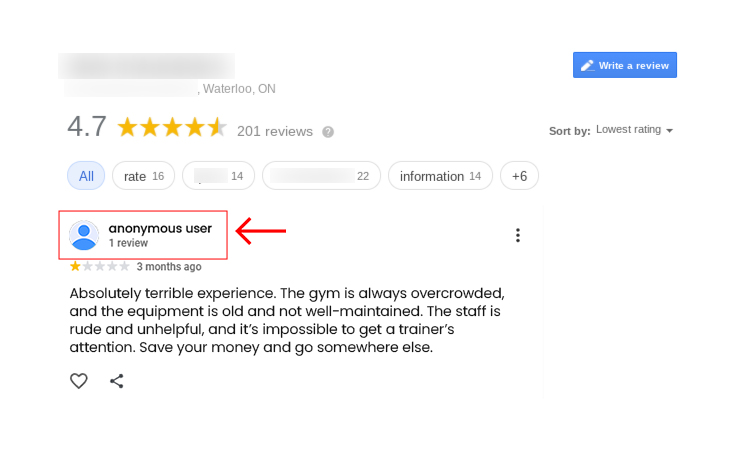
You’ll get to see these reviews posted by some fake user accounts with no proper information or profile picture. Individuals or businesses often create such accounts to post spam reviews. You may not notice any other online activity of those user accounts or any reviews shared by them, except the one they’ve shared against your local business.
Example: For instance, you have received some reviews from the same user account that has a generic profile name like ‘anonymous user’. The user account has no profile picture and has no or limited online activity or review history.
Should You Care if Your Local Business Has Started Receiving Spam Negative Reviews?
Yes absolutely! You must take it seriously if your local business is receiving too much review spam. While negative reviews also have some positive impacts on your local business, you need to remember one thing that these are not genuine negative reviews. The reviewer has the intention to spam your review feed and convey a negative image of your local business. So there is nothing to learn and make improvements for.
False negative reviews can damage your local business’s online image and make your ratings drop drastically. Nowadays, people prefer to check online reviews and ratings before they decide to purchase a product or make use of a service. A study by Wisernotify has shown that 87% of people want to see 3-5-star ratings of a business before they consider it.
Imagine a potential customer has checked your local business’s reviews and they see it has 2.5 stars with a lot of bad reviews. Will they take a chance to consider your products or services? Most probably, not!
How Review Spam Can Affect Your Local Business?
Wondering what impact spam reviews can have on your local business? Let’s find out. Here we will discuss how review spam can affect your local business’s online reputation in numerous ways.
- Erosion of Trust
Spam reviews create a misleading view of your product or services and potentially impact your prospects’ purchase decisions. This way, they make it difficult for your potential customers to trust the authenticity of those online reviews as well as your local brand.
- Negative Impact on Search Engine Rankings
Spam reviews can adversely affect your local brand’s search engine visibility. They can push down your local business in search engine rankings and make it harder for people to find it online. Thus, you must prevent these poor search engine rankings by fighting review spam.
- Unfair Competition
It can create an unfair competitive landscape for your local business. If your brand engages in ethical practice, then you may struggle a lot to compete in the local market using those spam reviews.
- Misinterpretation of Reputation
Spam reviews can significantly impact legitimate local businesses’ online reputation. They can drop the online ratings, and you cannot attract new customers with thousands of negative reviews and poor ratings. Sometimes, the tarnished reputation of a local small business is difficult to repair.
- Customer dissatisfaction
Spam reviews can damage a business’s reputation and destroy customer trust. Your potential customers are more likely to be dissatisfied seeing poor reviews of a business they have thought of considering in the future. It can mislead the customers as they may not match the positive claims of your brand in those fake reviews.
- Legal Consequences
If you buy or manipulate your online reviews, you may face legal penalties. This situation can lead to serious legal consequences as online platforms like Google may penalize your business for violating their terms of service related to online reviews.
How to Differentiate Spam Reviews from Original Reviews?
As a local business owner, you may receive a lot of online reviews, both positive and negative. Do you know that positive reviews can also be spam? Yes, you heard it right. However, it’s quite difficult to differentiate between an original review and a spam one.
Check the following factors to identify an original review.
- A genuine customer who has purchased a product or service from your local business previously has shared a review.
- The customer’s user account will have an original profile picture and an authentic username.
- The review represents the facts of a purchase experience with proper explanations and reasons.
- The review properly adheres to the policies of the review platform on which it is published.
A Bonus Tip: You must not consider a negative but accurate customer review as spam without checking the above facts. Negative sentiment can be highly subjective unless the reviewer intentionally misrepresents facts related to a business.
For example, a local restaurant franchise may believe that its meal prices are fair, while certain customers may consider those meals extremely expensive. We know that it’s embarrassing for a business to see that its customers are complaining about their offerings. But that doesn’t mean that you should see every negative feedback as spam.
We suggest you correctly analyze the specific customer’s negative experience. It will help you understand whether the review is a misrepresentation or an accurate observation. Negative reviews that are not spam are unlikely to be removed from the online review sites.
Major Reasons Why People and Businesses Write Spam Reviews?
A reviewer can share spam reviews regarding your local business for various reasons. Not only the individuals but also your competitor brands can leave review spam. Though the main intention is to damage your online reputation, the reasons may vary based on the situation.
Let’s have a look at who and why can leave spam reviews about your local business. Identifying the reviewers and understanding their reasons can help businesses stay vigilant in fighting review spam to maintain credibility.
Who Can Share Spam Reviews?
- A competitor business owner who writes fake reviews to hurt your local business’s reputation and grow his own brand.
- An employee or an online marketer falsifies a review to manipulate public perception about a competitor’s local business.
- A person who has never had a transaction with your business pretends to be your customer and has negatively reviewed your business to harm its reputation.
- An individual who purchased a service or a product from your business but has left fake reviews with incorrect details to misrepresent facts for their own advantage.
- A person who has received an incentive or gets monetary benefits to falsely review your local business.
- A reviewer who has violated the guidelines of the review sites on which he/she has left the review, such as attacking you personally, or promoting hate speech
Why the Above-Mentioned Individuals Can Write Spam Reviews?
These are some major reasons why people can leave spam reviews.
- Blackmail/ Extortion – Individuals can ask for monetary benefits under the threat of negative reviews or blackmail you regarding the same.
- Revengeful Mindset – A former employee from your team can pretend to be your customer and take revenge on you by leaving highly negative online reviews due to their disturbed relationship with you.
- Protest – A group of people can leave thousands of fake reviews about your local business as a protest against any of your actions or speech that hurt their sentiment.
- Public Perception Management – You can ask your employees and close ones to leave positive reviews for your brand or negative reviews for your competitors to control or manipulate public perception.
- Ranking Manipulation – Local businesses can tell their employees to leave reviews or offer incentives to people in exchange for reviews about their offerings, as the total review count can positively impact Google’s local pack rankings.
- Wages – Businesses can buy reviews by hiring spammers and asking them to write numerous positive or negative reviews for their own benefit.
- Lack of Awareness – Individuals who lack awareness regarding the guidelines of online review platforms or the potential negative consequences of their fraudulent feedback often write spam reviews.
How Can You Identify Spam Reviews: Facts to Check
The first step to identify a spam review is to monitor the reviews accurately. Without proper analysis, it’s difficult to spot a fake review. Because positive reviews can be spam, and not all negative reviews are fraudulent.
According to a Hubspot research result, fake reviews cost U.S businesses nearly $152 billion annually due to reputational damage and lost sales opportunities. If you want to avoid such financial and reputational loss, you need to identify spam reviews. Check the following factors to identify spam reviews about your local business.
- Weird Languages – Whether the review contains weird, overly dramatic language, generic phrases, similar wordings, or silly grammar and spelling mistakes
- Strange Patterns – Whether the reviewer’s profile shows too many geographic locations as visited, has a pattern of rating 1-star to every business
- Strange Numbers – Whether there is an unnatural number of reviews your local business has received within a short period (e.g., 10,000 reviews in just one week)
- Fake Customer – Whether the reviewer is actually a customer of your local business or he/she is just pretending to be one
- Odd Facts – Whether the review contains odd facts that are irrelevant to your local business
- Guideline Violation – Whether the reviewer has violated the guidelines of review site platforms, written obscene or hateful content, or personally attacked you online
- Threatful Content – Whether the reviewer threatens you with a negative review to ask for financial benefits from you
- Fake User Account – Whether the reviewer has a suspicious user account with no or stock profile photo, limited online activity, and essential information
- Lack of Details – Whether the review lacks specific details about the purchase experience
- Appreciation for Competitors – Whether the review contains frequent mentions of or praise for your competitors
What Should You Do if Your Local Business Gets Trapped with Spam Reviews?
Fighting review spam requires you to follow certain steps and implement some effective strategies. Without a proper strategic approach, you cannot combat those reviews and protect your local business’s online image. Below, we have mentioned the top 10 strategies to implement when your business is trapped with spam reviews. Let’s have a look.
- Claim and Regularly Check Your Business Listings
Do you have a Google Business Profile (GBP) for your local business? Does it contain all the necessary information a potential customer may look for? If not, then you must create or claim a profile on GBP and include all the essential NAP details of your local business. NAP details stand for –
- Name of your business
- Its address
- Accessible phone number
Inconsistent details can make it difficult for your prospective customers to find and locate your local business. You can add your business hours and a brief description of your products and services as well.
You must verify your listing frequently, at least once a week to track whether there is any spam listing. Otherwise, spammers can change those details about your business to reroute users. If you regularly check your local business listing, you can find and fix these errors made by spammers before they negatively affect your business.
Do you know that spammers are likely to target unclaimed business listings? Accurate claiming and regular monitoring can prevent unwanted modifications and help you improve your online reputation.
- Use Strong Passwords
We suggest you create memorable yet unique passwords to sign in to your review site accounts and business listings. Try to create different passwords for every online review platform where you’ve an account. It’s not recommended to use the same passwords as they are more likely to be hacked easily.
57% of people in the United States admit to recycling variations of old passwords. Are you one of those, too? If yes, then you’re giving too many opportunities for the spammers to hack your review site accounts. Strong passwords are the key to safeguarding your local business listings.
Tips to Create Strong and Unique Passwords for Your Business Listings
Here are some ways you can create strong passwords.
- Create passwords that combine characters, numbers, and symbols. (e.g., h@ppyL1fe!_2024 )
- You must include long and random words written in a mix of uppercase and lowercase letters. (e.g., R@nd0mP@sswOrd!)
- You must avoid using easily guessable patterns, dictionary words, or predictable sequences in the password.
- Update and change your passwords regularly as it can prevent unwanted access to your accounts.
- Keep the password within 12 characters, but always remember that the longer the password is, the more complex words and special characters you can add to it.
- Don’t reuse the same password across multiple sites and sequential numbers like 1234. Try to consider passphrases with a mix of characters such as Mydog!sleeps7under$the.
- Never add any personal information to the password, such as your name, birthday, address, or contact number.
- Another crucial factor is to enable multi-factor authentication to add an extra layer of security.
- Positively Respond to Reviews
No matter whether the reviews are positive or negative, you must respond to them positively. Interact with every listing review you receive and react accordingly without participating in any arguments. When you react to every review, it shows how actively you monitor your profile and how much you value your customers’ opinions.
It will also make it simpler for you to identify spam reviews and report or remove those before they affect your local business negatively. Such responses will help you in fighting review spam later. Let’s check out how a local business owner can respond to reviews.
- Thank the reviewer – You must sincerely express your gratitude for the feedback the reviewer has shared. Additionally, you can acknowledge the time and effort the reviewer has invested in sharing their experience.
- Personalize your response – You can address the reviewer by their name and refer to specific details mentioned in the review.
- Maintain professionalism – Write your response in a positive and welcoming tone to reflect your local brand’s personality. You need to avoid generic responses and aim for an authentic message.
- Highlight positive aspects – You can convey the specific strengths and positive aspects of your products and services in your response.
- Address reviews accordingly – If you identify a review as spam, address it in your response. It will convey a clear idea of your accurate review monitoring to potential customers.
Examples of Review Responses
For instance, you’ve received a genuine feedback for your local jewelry business – ‘Premium jewellery seller in our locality. A brand trusted by many! Great quality, affordable price, and outstanding customer service. Highly recommended to all!’
You can respond like this – ‘Thank you so much for your kind words, (Customer Name)! We’re thrilled to hear you enjoyed your purchase of our jewelry. We appreciate the time and effort you took to appreciate our brand. Visit us again!’
While for a spam review posted by a fake user account, your response can be – ‘We appreciate you taking your valuable time to leave a review. We ensure to stay committed to providing the best possible services for all our customers. However, we have no record of a customer with your name or experience at our jewelry store. It’ll be great if you share your contact details to help us identify you and resolve your concerns.’
- Report and Remove Spam Reviews
Google, Yelp, and Facebook are the top three review sites where you must create an account for your local business. A Backlinko study has claimed that the two review sites, like Google and Facebook, contain 40% and 37% of fake reviews, respectively.
If you spot any spam reviews, you must report or remove the spam on your listings immediately. You need to give details about the spam reviews and provide any supporting documents you have as proof.
When you promptly act upon those spam reviews and remove them from your listings, it ensures that your potential customers receive accurate information about your local business. Prompt reporting and removal of spam reviews can help preserve the integrity of your business listings.
Here we will talk about how you can report or remove spam reviews from different review sites. Explore the process and follow it accordingly.
How to Remove Spam Google Reviews and Google Business Profile Reviews?
If you have already spotted a fake review, it’s time to remove it. When it comes to Google, the process may not be as simple as it sounds. You need to provide enough proof to support your claim that a specific review is fake. Google allows anonymous usernames, and this fact makes it hard for you to prove that anyone’s online identity is fake.
Here’s how you can remove the fake reviews from your Google business listing.
- Respond to the review professionally and address the fact that there is no customer with the reviewer’s name, who has interacted with your local business in a while.
- Now that you’ve responded, you can flag the review by clicking on the flag symbol and visiting the ‘Report a Policy Violation’ page.
- If you’re struggling with review management, you can consider implementing effective Google review automation strategies for your local business.
- However, the Google team will contact you if they require more details. You can use the owner’s response function to mention that you’ve reported the review to Google for guideline violation.
- You can contact the Google support team via email or phone to speed up the process. Be prepared with your supportive documents and photos to strengthen your claim regarding the fake review. If they decide to remove the review, they will contact you.
How to Remove Spam Reviews from Yelp?
This is another popular review platform that offers guidelines for reporting reviews. The platform advises business owners to respond to reviews that violate their guidelines. It prioritizes the quality of a review and sets high standards for it regarding identifying spammers. This review platform plays a huge role in fighting review spam and promoting customer trust.
Follow the steps to remove spam reviews from Yelp.
- You can respond to the spam reviews and click the flag icon at the bottom of the review.
- A list of reasons will appear; you can select the correct reason and submit it.
- The team will verify your claim and consider your request to remove that specific review.
- We suggest you report a review when that is an outright violation of Yelp’s terms and conditions.
How to Remove Spam Reviews from Facebook?
You can only report Facebook reviews with text, not those solo ratings. You can turn off the reviews on Facebook, but you may miss the opportunity to go through genuine negative reviews and improve your offerings.
Follow these steps to report and remove a spam review on Facebook.
- You need to click on the three dots in the top right corner of the fake review.
- You can see the button of ‘report post’ that you need to click on.
- Follow the instructions that appear on your screens and submit your claim. You can attach supporting documents to strengthen your claim.
- The Facebook administrator will review it and remove the review if they find your claim genuine.
- Educate Your Customers
Education plays a huge role in online review monitoring and management for a local business. As a local business owner, you may face review spam and should be prepared to take quick action to avoid the consequences. Educating your customers beforehand is one of the most beneficial strategies to prevent the serious consequences of fake reviews.
You can advise your existing customers to report if they notice any inconsistencies in your listings. Additionally, we suggest you alert your clients to the likelihood of spam reviews. You can alert them through your social media posts, in-store posters, and mentions in emails and receipts.
When your clients are well-informed, they can easily notice such reviews and inform you before those spam negatively affect your local business’s reputation. This additional protection is crucial for local businesses if they want to initiate meaningful interactions with their customers and engage them more.
- Keep Your Business Information Updated
What can a spammer do to damage your GBP listing? They can manipulate your NAP details or any other information mentioned in those listings, along with sharing fake reviews about your local business. The easiest way to prevent this is to update that information regularly across all review platforms.
For example, you’ve recently relocated your business to a new city, changed your phone number, or modified your operating hours. You must accurately add the updated details in the local business listings. Consistent updates of essential details regarding your local business significantly promote customer trust.
- Take the Legal Route
If the situation goes out of your hands and you notice that someone is intentionally targeting your business online and posting fake reviews about it, you can take legal action. However, you must have valid proof of that specific reviewer. You can hire a lawyer and allow them to handle the matter professionally.
If the reviewer has posted any review that contains hate speech or malicious content, your lawyer may send them a legal cease or desist notice. The lawyer may also simply threaten the reviewer with sending a legal notice if they feel that it is enough to handle the situation.
Pro Tip: You shouldn’t engage in heated arguments with such spam reviewers on social media or any other digital platforms. Because it can severely damage your online reputation and your market competitors will find more opportunities to accuse you. You need to strategically and professionally interact with those reviewers.
- Employ Tool to Monitor and Manage Reviews
No, you don’t need to do everything yourself! There are tools that you can use to monitor and manage your online reviews. If you’re confused about which tool can offer you the maximum benefits in fighting review spam, here we’ve come to your rescue. Below, we have mentioned the usefulness of the top 5 online review management tools, especially to combat spam reviews. Let’s have a quick look.
Top 5 Most Beneficial Online Review Management Tools
Explore how the following tools can help you manage your online reviews and protect your local business from fraudulent reviews.
- Google Alerts
It’s a free tool that you can use to monitor your brand mentions. In simple terms, you can track and manage the mentions of your local brand across the web. You can use it for your basic brand reputation tracking. However, it lacks advanced review management features.
The following are some crucial factors related to Google Alerts.
- It’s easy to set up and free to use, so you don’t need to invest a single penny to use this tool.
- It notifies you when your brand is mentioned on digital platforms.
- It offers limited social media monitoring facilities. So the tool is not ideal for in-depth review analysis or automated responses.
- ReviewTrackers
This specific tool focuses on managing your local business’s customer reviews across various digital platforms. You can stay informed about what the public perceives about your local brand, as ReviewTrackers allows you to track reviews and public sentiment over time.
Below, we have highlighted some important factors related to this tool.
- It helps you in comprehensive review tracking and seamlessly analyzes public sentiment about your local brand.
- It has some features that serve as reporting tools. However, this tool is not user-friendly like other review management platforms.
- For in-depth review analysis, you can consider this tool.
- BirdEye
Need an all-in-one platform to manage the experience your customers have with your local business? You can use BirdEye to track and manage the customer reviews you receive, the reputation your local brand has on social media and other digital platforms. You can use its AI-powered review responses, analytics, and integrations to meet your review management needs.
Explore the key factors related to this tool.
- It offers you AI-powered features and integration facilities. You can use this tool for comprehensive review management regarding your local business.
- If you’re looking for a budget-friendly tool, BirdEye may not be the ideal choice for you. Because the pricing of this tool is comparatively higher than other simpler review management tools.
- Podium
Want to ensure effective customer interactions? If yes, you must consider this specific tool to streamline communication with your customers, manage customer reviews, and collect important feedback.
Some crucial factors about this tool are mentioned below.
- You can receive review requests via SMS or email and use this tool to engage more with your customers.
- Podium offers centralized review management facilities that can be extremely beneficial for your local business’s online reputation.
- But these review management features may not provide you with the same depth of analytics as compared to the other tools.
- Mention
This tool is known for its social media and online monitoring capabilities you can utilize to track your brand mentions. When you track the public sentiment related to your local business across various online platforms, it immensely helps you in fighting review spam.
Let’s have a look at the major factors of this tool.
- You can perform extensive social media monitoring, public sentiment analysis, and reporting.
- If social media is your priority and your local business is more likely to attract more customers from its social media following, you can prioritize this tool.
- But the review management features of this tool are less robust than other dedicated review platforms.
- Generate Positive Reviews
Positive feedback from your existing customers plays a huge role here. Positive customer reviews build trust and act as word-of-mouth recommendations to attract more customers. Did you know that 74% of consumers feel that positive Google reviews help them trust a business more? It can even help in crucial situations when your local business is bombarded with fake reviews.
Imagine that you’re suddenly receiving hundreds of spam reviews related to the products and services of your local business. People who will visit your social media profile or GBP profile to check your business’s reviews will get to see those negative spam reviews at first. And this may not leave a great first impression of your local business.
If your social media and GBP profile already have a good number of positive original reviews from your existing customers, the situation can be handled more easily. Those positive reviews can bury the spam ones to some extent and boost your local brand’s overall rating.
7 Tips to Generate Positive Reviews for Your Local Business
How can you generate positive reviews from your customers? This requires you to follow a strategic approach. Explore the top 7 useful tips to generate positive reviews for your existing customers.
- Respond to All Reviews
You must respond to both positive and negative reviews as it will showcase that you truly value your customers’ opinions. Professionally respond to the negative reviews. If they seem genuine, you must try to resolve their queries at the earliest. On the other hand, you must thank your customers for their positive reviews and appreciate them for taking the effort to review your business.
- Request Your Customers to Leave Reviews
You can directly ask your customers to share their experience with your local business. You can do this in person, via email, or even through social media direct messaging. Your loyal and real customers who have received excellent service from your business will be happy to review your brand; you need to nudge them a little.
- Send Regular Reminders through Follow-up Emails
You must send follow-up emails to your customers after they purchase a product or seek a service from your local brand. Timely reminders through emails can increase the likelihood of receiving positive reviews from your satisfied customers.
- Make the Process of Leaving Reviews Easy
The process of leaving a review must be easy to understand for all types of customers, no matter what their qualifications and skills are. If the process is complex, many satisfied customers may leave your review site without sharing their feedback. You can list your local business on relevant review sites like Google and Yelp. We suggest you incorporate clear CTAs on your website to direct customers to the review site.
- Display Reviews on Website
Generating positive reviews from customers is not enough. You need to showcase those reviews on your website to display them as social proof. Those testimonials will boost your site’s SEO as you need to add fresh content for it. Additionally, the presence of positive customer reviews on your official website will encourage others as well to share their experience.
- Offer Incentives for Your Customers
If multiple email reminders fail to generate reviews from your existing customers, this trick will surely work. You can offer incentives like product discounts, exclusive deals, coupons, or free entry to contests to your customers. These are the best ways to motivate your customers to write online reviews about your local brand and ensure repeat business.
- Share on Social Media
After receiving those reviews, you can share them on your social media profiles to highlight how satisfied your customers are with your products and services. Sharing reviews on social media can encourage others to share their feedback as well. It will work as a brand promotion and help you in fighting review spam.
- Advocate for Yourself
Nowadays, consumers prefer to read online reviews before they form an opinion about your business. If most of your online reviews are negative spam and your potential customers come across those before deciding to purchase, imagine how much negative effect it can have on your brand’s online reputation.
As a local business owner, you don’t own a review site but have the power to advocate. You can publish regular blogs on your website related to the spam reviews you receive through some review sites. Furthermore, you can collaborate with other local businesses to organize a meeting with the team of a specific online review platform to discuss the pain points. Raising these issues repeatedly can resolve the matter more effectively.
Conclusion
Receiving spam reviews is normal, especially in today’s competitive market scenario. Businesses must have a skilled team that can effectively monitor online reviews and handle spam. Specifically, the local businesses must implement effective strategies for fighting review spam. Otherwise, they can hinder their customer trust and damage their online reputation.
We hope that our comprehensive guide will help you in protecting your local business’s online image from these fake reviews. You can follow our proven strategies to fight against those spammers and advocate for your local brand. However, it is also advisable to seek professional online reputation management services from a reputable agency to handle crucial situations effectively.

